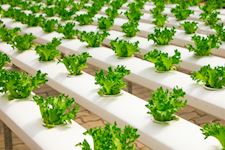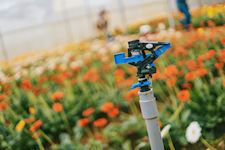Hydroponics - Diploma - (TQUK - Training Qualifications UK)
Distance learning course with study materials, tutor support and final exam included
Academy For Distance Learning
Summary
- Certificate of completion - Free
- Exam(s) / assessment(s) is included in price
- Tutor is available to students
Add to basket or enquire
Overview
Hydroponics Online Course. 600 Hours Diploma Course. (Endorsed by TQUK - Training Qualifications UK).
Diploma in Hydroponics course online. Understand how to grow plants without soil. This course provides an understanding of modern technology and its application to growing plants, with emphasis on hydroponic production.
This course comes with a complimentary copy of Commercial Hydroponics, as some of the lessons involve set reading from this EBook.
Benefits of an ADL Endorsed Course?
Endorsed courses are skills based. They have been evaluated and approved by an independent awarding body such as Training Qualifications UK (TQUK).
What makes ADL’s Endorsed courses different?
- Flexible Self-Paced Learning– adjust your learning around your home and work commitments
- Start and Finish at any time
- Courses globally and industry relevant
- Practical Component at the end of most lessons.
Allocated your own tutor relevant to your subject. You can have as little or as much contact as you like with your tutor. They are there to support you all the way through.
This course is endorsed by TQUK -Training Qualifications UK, an OFQUAL awarding body.
Achievement
Certificates
Certificate of completion
Digital certificate - Included
Course media
Description
Lesson Structure: Diploma In Hydroponics VHT013
This subject has 30 lessons, each requiring about 12-15 hours of study:
1 Introduction to Hydroponic Technology
- Introduction
- Resources
- Set Reading
2 Plant Growth Requirements: Light, artificial light, light balancers
- Photosynthesis
- Artificial Lighting
- Lighting Equipment
3 Plant Growth Requirements: Nutrition- nutrient requirements, deficiencies, toxicities, pH, conductivity, salinity, growth regulators
- How Plants Grow
- Similarities between Soil and Hydroponic Growing: Chemistry, The Atomic Nature of Matter, The Structure of Atoms
- Biochemistry
- Hydroponic Nutrient Formulae
- Mixing Nutrients
- Plant Nutrition - The Nutrient Elements
- Major Elements
- Minor Elements
- Total Salts
- Diagnosis of Nutritional Problems - including Table : Nutrient Deficiencies
- Fertilisers
- Choosing the Right Fertiliser
- Natural Fertilisers
- A Look at Organic Fertilisers
- Temperature Requirements
4 Plant Growth Requirements: Temperature
- Temperature Requirements
- Set Reading: Commercial Hydroponics - Ch. 2
5 Hydroponic Growing Systems: Basic concepts and designs, site considerations.
- Intoduction
- Commercial Systems:
- Simple Systems
- Dug in Aggregate Bed
- Automated Systems
- The Bentley System
- What makes up a System
- Horticultutal Rockwool - Australian Experiences
- Development of Propagating Blocks
- Propagation Applications
- Recomended Practices for Propagation
- Benefits of using Rockwool Propagating Blocks
- Limitations experienced in the use of Rockwool Propagating Blocks
6 Growing Media:Types, properties, uses.
- Set Reading: Commercial Hydroponics Chapters 6, 7 and 8
7 Hydroponic Nutrient Solutions:Nutrient formulae, preparing solutions
- Dutch Recommendations for Nutrient Solutions
- Example of Standard Formala to be Mixed with Rainwater
8 Hydroponic Equipment:Componentry, nutrient delivery, pumping, testing
- Salintary Controllers
- pH Controllers
- Set Reading
9 Growing Structures:Design and Construction - types
- Growing Plants in a Greenhouse
- The Greenhouse System
- Types of Greenhouses
- Greenhouse Checklist
- Commonly used Grennhouse Designs
- Shape of Structures to Maximise Light Transmission
- Siting Greenhouses
- Plant Needs
- Problems with Greenhouses
- Horticultural Management in a Greenhouse
- Fungi
- Common Fungal Problems
- Plants and Water
- Water Excess
- Water Defficiency
- Greenhouse Irrigation Methods
- Culture and Management of some Greenhouse Crops
- Optium Growth Requirement for Certain Plants
- Greenhouse Benches and Beds: Shelving or Staging, Ground Beds, Raised Beds, Pot Crops, Flooring, Guttering, Doors
- Principles of Temperature Control
- Solar Energy Applications in Horticulture
- Nature of Solar Energy
- Greenhouses
- Active Systems
- Nature of Active Solar Heating Systems
- Selected Solar Greenhouse Facilities 1 Air Based Systems
- Selected Solar Greenhouse Facilities 2 Water Based Systems
- Set Reading: Commercial Hydroponics Chapters 9 and 10, Optional reading
10/11 Environmental Control A:Heating, Cooling and Environmental Control B - Lighting and Shading
- Environmental Control
- Environmental Factors that Influence Plant Growth
- Measurment of Environmental Factors
- Heating
- Temperature Control
- Heat Loss: Table
- Localised Heaters
- Ventilators
- Cooling (Ventilation)
- Light Factors
- Artificial Light
- Lighting
- Shading
- Set Reading: Commercial Hydroponics Ch 10
12 Environmental Control C:Carbon Dioxide Enrichment
- Methods of CO2 Injection
- Carbon Dioxide
- Effects of Carbon Dioxide
- Standard Night Temperatures at which Greenhouse Flower Crops are Grown
13 Plant Culture In Hydroponics A: Trellising, pruning, pollination, transplanting
- Fruit Set Management
- Controlling Plant Growth
- Growth Control
- What is Hydroponic Trial?
- Running a Crop Trial
- Research Methodology
14 Plant Culture In Hydroponics B
- Introduction
- Post Harvest Storage
- Hydroponics Pests and Diseases
- Diseases
- Plant Viruses - Their Detection and Diagnosis
- Virus Control
- Environmental Problems
- Common Environmental Problems
- Set Reading: Commercial Hydroponics Ch.11 Plant Culture
- Optional Reading
15 Aggregate Culture
- Set Reading: Commercial Hydroponics Chapter 7
16 Nutrient Film Technique (NFT) Culture
- Set Reading: Commercial Hydroponics: Chapter 5
17 Rockwool Culture
- Set Reading: Set Reading: Commercial Hydroponics: Chapter 5
18 Other Techniques:Wick systems, flood & drain, bag culture, aeroponics, etc.
- Set Reading: Commercial Hydroponics Chapter 8
19 Irrigation: Soil Requirements
- Objective of Irrigation
- Irrigation - The Wide View
- The Value and Feasibility of Irrigation
- Soil and Water
- Transpiration and Wilting Point
- Measuring Water Available to Plants
- Naming the Soil
- Improving Soils
- Soil Characteristics and Problems: Chemical Properties, Soil pH, Table
- Internal Drainage
- Rooting Dephs of Selected Plants
- Irrigation Calculations
- Set Reading:
20 Irrigation Systems
21 Plant Propagation:Seed & cutting propagation & tissue culture
22 Market Gardening:Cut Flowers
23 Market Gardening:Vegetables
24 Other Plants in Hydroponics
25 Pests and Diseases
26 Weeds
27 Managing a Commercial Hydroponics Farm
28 Management - Organisation and Supervision
29 Marketing - Promotion and Selling
30 Special Project
Each lesson culminates in an assignment which is submitted to the Academy, marked by the Academy's tutors and returned to you with any relevant suggestions, comments, and if necessary, extra reading.
Who is this course for?
Horticulturalists, Home Gardeners, Gardening Professionals, Agriculturalists, Farmers,
Requirements
A pc or laptop with internet connection
Career path
Studying Hydroponics creates a world of potential for every nature lover in search of a new career. This course provides an understanding of modern technology and its application to growing plants, with emphasis on hydroponic production. Plants are one of the most important organisms in our world. We eat them, we grow them, we use them for ornamentation and even medicine.
Questions and answers
What is the type of course content- Videos, Documents, PPTs?
Answer:Hi Hatim Our course are online document based. Every student is assigned their own dedicated tutor who is an expert in their subject area. They provide as much or as little individual contact as you require. You can contact your tutor whenever you need – your hours are not limited. Our courses also have "practical assignments", which give you the opportunity to undertake practical work to help you acquire further knowledge, skills and experience. Regards Amanda White General Manager
This was helpful.Is this a level 5 course?
Answer:Hi Val Many thanks for your enquiry. Yes, this is a level 5 Diploma (Course Code VHT013), evaluated and approved by the independent awarding body: Training Qualifications UK (TQUK). Currently we're offering a discount on this course, from the normal price of £1950 to £1365. Please let me know if this is of interest to you, so I can make the necessary arrangements. If you require any additional information please do not hesitate to contact me. Kindest regards Amanda White General Manager
This was helpful.Good day Divide Buy is not available for me as I am not in the UK, is there any other way I can be able to pay using the installment option?
Answer:Hi Lebohang Paulus Many thanks for your question. ADL do not offer any loans I'm afraid. You can always contact us directly to discuss your options though. Unfortunately, I cannot place a URL address on here or telephone number, so please google: "ADL, Academy for Distance Learning" and we are the first search result. We look forward to hearing from you. Kindest regards Amanda White General Manager
This was helpful.
Reviews
Currently there are no reviews for this course. Be the first to leave a review.
Legal information
This course is advertised on reed.co.uk by the Course Provider, whose terms and conditions apply. Purchases are made directly from the Course Provider, and as such, content and materials are supplied by the Course Provider directly. Reed is acting as agent and not reseller in relation to this course. Reed's only responsibility is to facilitate your payment for the course. It is your responsibility to review and agree to the Course Provider's terms and conditions and satisfy yourself as to the suitability of the course you intend to purchase. Reed will not have any responsibility for the content of the course and/or associated materials.





